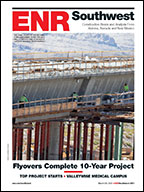The Senate April 17 overwhelmingly approved a "technical corrections" highway bill that will ensure that numerous highway projects authorized under SAFETEA-LU continue to move forward. The Senate also approved an amendment by Sen. Barbara Boxer (D-Calif.) that will request a Justice Dept. criminal investigation into a controversial earmark in SAFETEA-LU that appears to have been altered after the bill was approved by both chambers in 2005.
A comparable highway bill passed the House last year. The 88-2 Senate vote ensures that hundreds of construction projects that could have been delayed due to technical mistakes and inaccuracies in the original highway bill language can now move forward. Pete Ruane, chief executive of the American Road and Transportation Builders Association, says, "This bill will allow almost 500 highway-improvement projects valued at more than $1 billion to move forward."
Some Republicans, led by Sen. Jim DeMint (R-S.C.), had complained during debate that the technical corrections bill was more than simply a "corrections" bill, increasing spending for some of the projects originally authorized under SAFETEA-LU and creating new earmarks. DeMint particularly objected to a provision that would have spent $45 million to extend a new magnetic levitation rail line in Nevada into California. SAFETEA-LU had approved the rail for Nevada, but the technical corrections bill called for the rail line to be extended to Anaheim, Calif.
Senate Majority Leader Harry Reid (D-Nev.) defended the change in the technical corrections bill, stating that the drafters of SAFETEA-LU had always intended for the rail line to extend into California from Nevada. "There was a mistake made, and there wasn't language put in that to allow contract authority," he said April 15.
The Boxer amendment, approved 64-28, calls for a criminal investigation into changes in the language related to a $10 million earmark in SAFETEA-LU for a highway project near Naples, Fla. The changes appear to have been made after the legislation was approved by both Houses of Congress in 2005. The earmark changes were requested by Rep. Don Young (R-Alaska), who received $40,000 in campaign donations from developers who owned property near the proposed project. Although Young has denied that he pushed the changes as a result of the donations, lawmakers want an investigation.
On the Senate floor during debate, Reid said, "The facts are not all known. But if these allegations are true, this is one more example of the corruption that permeated the Congress in recent years."


Post a comment to this article
Report Abusive Comment